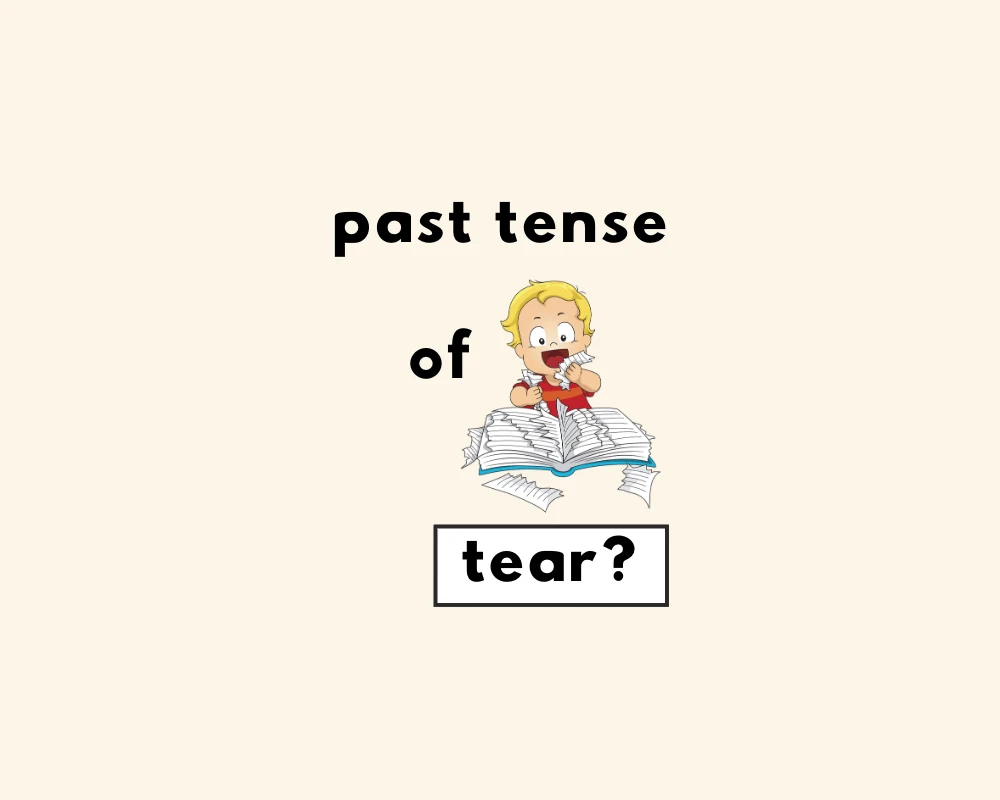
What’s the past tense of “tear”?
The irregular verb tear, which is the “pulling or ripping apart of (something) to pieces”, is tore in the simple past, and torn as a past participle.
You’ve torn your jeans!
I tore my shirt accidentally.
He had tore the letter before reading it.
They’ve tore through the whole series.
As a noun, a tear (sounds like year) refers to the liquid from our eyeballs when we cry. More technically said, a tear is a “drop of clear saline fluid secreted by the lacrimal gland and diffused between the eye and eyelids to moisten the parts and facilitate their motion.”
The irregular verb, ‘tear’
Tear is the present tense: careful—the fabric tears very easily.
Tore is the simple past tense: I tore my jeans on the fence.
Torn is the past participle form: His jacket had been torn to shreds on the barbed wire.
For the definitive list of the forms of ‘tear’, see the chart.
| present | past | future | |
| simple | I tear | I tore | I will tear |
| continuous | I am tearing | I was tearing | I will be tearing |
| perfect | I have torn | I had torn | I will have torn |
| perfect continuous | I have been tearing | I had been tearing | I will have been tearing |
The verb tear uses 3 forms in the past and present, and has a similar pattern as the following irregular verbs in the chart:
| base verb | past tense | past participle |
| wear | wore | worn |
| tear | tore | torn |
| swear | swore | sworn |
| steal | stole | stolen |
| break | broke | broken |
When should you use tore or torn?
I tore my jeans on the fence.
His jacket had been torn to shreds on the barbed wire.
When we speak of the differences between the past simple tense and the past perfect, there are a number of key differences to be on the lookout for. First, auxiliary verbs pair with the participle form of a verb, which, in this case, is torn. This is not the case with the simple past tense, which is likely why it’s called the ‘simple past’.
The past perfect tense, which is formed by the auxiliary ‘had‘ + past participle, is used to clarify the order in which past events took place. We use the past perfect tense to indicate that an action or event was completed or had happened before another action or event in the past. This conveys a slightly more complex relationship with time than the simple past, which simply describes an action that was completed at a point in the past.
Remember to always pair participles with an auxiliary! For perfect tenses, use ‘have’, ‘has’, or ‘had’. For continuous, use a form of ‘to be’.
“Tear” / “tore” / “torn”, used in sentences
| Examples: tear / tears / tearing, used in sentences |
|---|
| You’ll need to tear the old wallpaper off the walls.
She tried to tear a small piece off the edge. You have to be very careful with books this old because the paper tears very easily. We’re tearing off the top of the packet. |
| Examples: tore / torn, used in sentences |
|---|
| I tore my jeans on the fence.
The fabric snagged and tore at the seams. A couple of pages had been torn out of the book. She was torn between staying and going. |
Synonyms of ‘tear’
- break
- damage
- hole
- crack
- fissure
- gash
- imperfection
- laceration
- perforate
Origin of tear
From etymology online on tear (v.):
To “pull apart,” Old English teran “to tear, lacerate”, from Proto-Germanic *teran.
Learn more about verbs
| Types of verbs & verb tenses | what’s the past tense of …? |
|---|---|
| forms of ‘to be’ | … seek? |
| auxiliary verbs | … teach? |
| present tense | … catch? |
| future tense | … buy? |
| past tense | … read? |
| perfect tense | … draw? |
| transitive vs. intransitive | … drive? |
| participles | … throw? |
| irregular verbs | … lead? |
| modals | … win? |
Worksheet
Which form of the verb “tear” is used for the simple past tense?
Which form of the verb “tear” is the past participle?
When is the past participle form “torn” typically used?
According to the post, the simple past tense “tore” is used:
Which sentence correctly uses the past participle form?
I carelessly the receipt when I opened the envelope.
She feels terrible because she has the important document.
By the time we found it, the kite string had already been .
His shirt was when he climbed over the barbed wire fence.
They down the old posters from the wall last week.
Frequently Asked Questions
What’s the simple past of tear?
+
What’s the past participle of tear?
+
When do you use ‘tore’?
+
When do you use ‘torn’?
+
Is “have tore” grammatically correct?
+
Yash, D. "What’s the Past Tense of Tear? Tore or Torn?." Grammarflex, Jun 15, 2025, https://www.grammarflex.com/whats-the-past-tense-of-tear-tore-torn/.
Sources
-
Harper, Douglas. “Etymology of tear.” Online Etymology Dictionary, https://www.etymonline.com/word/tear. Accessed 14 January, 2023.











